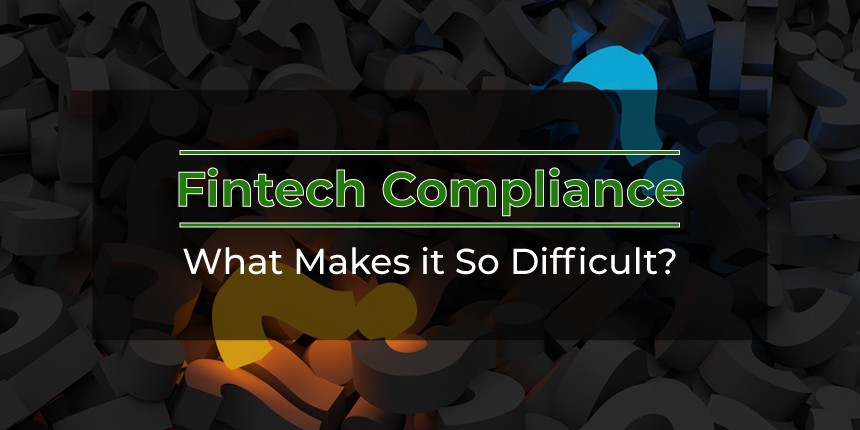Fintech Compliance – Boogeyman for Trillion Dollar Industry?

Fintech industry is flexing its muscle by bringing onboard more and more customers and innovating their way to higher valuation and larger transaction volumes. Only in the US alone, the year 2018 saw $11.89 Billion funding go into Fintech ventures and more than $ 100 Billion was invested globally in Fintech Ventures. Right now there are 39 Fintech Unicorns in the world with a total estimated worth of $147.37 Billion. Digital payments through Fintech products surpassed $3.5 Trillion in 2018 and are expected to hit the benchmark of $6.6 Trillion in the next 5 years. Fintech companies have ventured into diverse business categories and financial services such as mobile payments, crowdfunding, P2P lending, online transaction platforms, and some Fintech are now even developing products for asset management as well. But this innovative brother of the conventional financial industry has had his own share of problems, with Fintech Compliance being the most prominent one among the rest.
It was recently declared on a Fintech forum that by 2030, the biggest bank of the world will be a tech company, but without properly introducing a tech-friendly regulatory landscape and investing substantial resources in regulatory compliance, this seems to be a distant dream.
The Cost of Non-Compliance
Several Fintech companies have been fined millions of dollars for one reason or another because of their inability to comply with specific user-centric regulatory guidelines. Dwolla was slapped a $100,000 fine by Consumer Financial Protection Bureau (CFPB) for misrepresenting its data security practices. Ripple Labs was made to pay $700,000 by FinCen for their inability to identify their business model as Money Service Business (MSB). One Fintech company had to pay $6 million after CFPB declared that the lending practices of the platform violated the consumer protection guidelines of the regulator. There are many other instances where Fintech companies were fined substantial penalties either for their inability to adopt consumer security compliance or because of lack of satisfactory safety net for user data protection.
Why Fintech Compliance is so complicated?
The idea behind Fintech was to use the latest technology, mobile phone leading the roost in the current decade, to create a streamlined user experience when it comes to the financial services industry. Small businesses and the common users were particularly sick of brick-and-mortar branch model and aspired for a service delivery model that was swift and efficient at the same time. Enter the Fintech products that championed the cause of “lightning fast transactions” and “minimal to no paperwork” business model.
But regulators were more concerned with the relative anonymity attached with Fintech products, transactions processed through these channels and susceptibility for these innovative solutions to be exploited by criminal elements to transfer funds for illegal activities. Money laundering and terror financing were even bigger concerns that called for strict financial technology compliance. But as one can assume, this was totally against the basic working principles of Fintech.

The Fog around Fintech Compliance
The complication of Fintech compliance is aggravated by the fact that the majority of regulators overseeing the financial service industry lack the specific guidelines to govern unique and innovative business models adopted by multiple Fintech companies. With the fluid and amorphous nature of Fintech companies, the brilliant minds behind such a booming tech industry also find it hard to pin down a single regulator that single-handedly deals with the kind of services that they have to offer.
And even when there is clarity about the regulator or the specific guidelines that a Fintech has to follow, it creates friction for user-experience. For example, if a Fintech startup is operating as a digital wallet, mobile payment system or peer-to-peer funds transfer service within US, they have to comply with Bank Secrecy Act’s (BSA) and will be designated as “Money Service Business”. As a result of this, the Fintech platform will have to develop an AML Compliance solution, perform KYC for every incoming user, report transactions beyond $10,000 and even have to file suspicious activity reports and if you are thinking that is it, then you are wrong. As a Fintech based in the USA, companies can fall under the purview of OFAC, FinCEN and SEC. For Canada, there is FinTRAC, UK has its FCA and Fintech companies Down Under have to follow the guidelines from Austrac.
But the hardest cooky of all was launched last year in the European Union, by the name of General Data Protection Regulation, a.k.a. GDPR that takes data security and user privacy to a whole new level even for the companies that are not based in EU but want to serve the clients based in its jurisdiction.
Recommended For You: 3 Reasons why RegTech is the Future of Innovation?
The Economics of Fintech Compliance
The cost of having a KYC utility or implementing an AML compliance solution can be really tricky for Fintech businesses. Not to forget the importance of a GDPR checklist for businesses to ensure that no provision of this EU data privacy law is left out in their business or service delivery practices. Now for conventional financial services companies such as banks or insurance industry, it is easy to bear the cost of compliance related expenses because of their large coffers of revenue, but for Fintech companies that are in their nascent stage of existence, it is important to scale the operations and balance their budgets accordingly. Fintech startups, like all other startups, are already limited in terms of resources and such huge regulatory fines can cripple the backbone of such early stage startups.
Another economic factor linked with Fintech compliance is that whenever a company, especially in their pre-valuation days, is fined by a regulator for non-compliance, it attracts a lot of bad press that is going to hit any future prospects of VC funding or pledge of investment from even a private equity as well.
Conclusion
It is not hard to guess that the future of the global financial system is dependent on Fintech products and even sovereign states and economic powers such as Germany has publicly admitted this fact in the recent G20 summit. But complying with regulatory guidelines will be crucial to sustaining the growth and trust in these products.
Regtech seems to be the right solution to counter the needs and demands of the Financial industry in general and Fintech companies in particular. There are several third-party service providers that are offering KYC services, AML compliance, and other tech products to comply with official guidelines of regulators. With a common technical background and hunger to disrupt conventional service delivery models, Fintech and Regtech can change the future of personal as well as institutional finance forever.

 Explore Now
Explore Now













